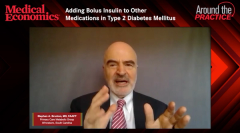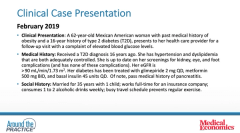
Introducing Diabetes Technology to Patients
Episodes in this series

Dhiren Patel, PharmD, CDE, BC-ADM, BCACP: For me, the more technology the better. I don’t want to get out of this seat if I don’t have to. I’m going to do voice activation and get something shipped. When we’re talking about diabetes technology, we’ve talked about insulin pumps, CGM [continuous glucose monitoring], and now a smart insulin pen. How do you introduce this technology? It’s not like on day 1, you book a 2-hour appointment. Walk me through what you just said. You introduce the InPen. You mentioned that you let the patient choose with shared decision-making. Do you talk about the insulin pump? How do you triage that and figure out how you’re going to use your 20 to 30 minutes with them?
Diana Isaacs, PharmD, BCPS, BCACP, BC-ADM, CDCES: The basics are key. If I have someone who is new and just diagnosed with diabetes, it’s not that I’m trying to get them on all this right away. I like to plant the seed, so I want to make sure the education about the basics is there for things like glucose monitoring and treatment of hypoglycemia, so they understand how to administer the medications and when to take them. I plant the seed. I say, “There are these different types of technologies out there. Just so you know, they’re available, and they are things you can look more into.”
I’ll even refer people to reputable sources to get more information. For example, 1 website I like is DiabetesWise.org, where the patient can learn about all the different types of technology when they’re ready. I make sure the basics are there, then I plant that seed. Through those ongoing appointments, we talk about it more. You don’t have to do it this way, but I am a big fan of CGM and getting that started. For many of my patients, that is the first big technology. They start using that and then start thinking, “OK, let’s talk about the smart pen and the insulin pump options.”
For many of my patients, it has been a natural progression to start with InPen and then go to an insulin pump, but it goes all different ways. Some people go straight to the insulin pump. There are certainly some advantages of the insulin pump over the smart pen in that you’re not having to put that needle in. It’s always on you. With that insulin pump, 1 big difference is that the insulin pump is serving as both the background and the bolus insulin vs the pen, which you still have to give a long-acting injection with. That’s 1 of the key differences.
Dhiren Patel, PharmD, CDE, BC-ADM, BCACP: That’s a great note to leave it at. We have a lot of technology options. Let’s give the patient choices and have a shared decision-making conversation. With anything we can do to chip away at that diabetes burden that’s on them and shift it to the device, they’re going to be that much happier and better off. We saw some of the specific things around quality of life: That is a big thing. Diabetes isn’t going away, so for anything we can do to diminish that in the background, there is a lot to be said for that quality of life. Thank you for walking us through that.
Diana Isaacs, PharmD, BCPS, BCACP, BC-ADM, CDCES: One other point I want to make is that I’m really into patient choice, that whatever you decide is also not forever. You give the InPen a try, so you do that for a month. Now you want to go back to your usual insulin pens, or you want to go to the pump to give the pump a try. I encourage people to be open-minded and try these because most of the time, it is improving their quality of life, but nothing has to be forever. Someone can go on a pump, and they could to decide to go off the pump. We want to give people choices.
Robert Busch, MD: Do you think when the weekly basal insulin is out, you’ll see more InPen use because it’s only 1 shot of basal insulin, and then they’ll be using the bolus insulin doses with the InPen?
Diana Isaacs, PharmD, BCPS, BCACP, BC-ADM, CDCES: That is a great point. That would certainly make it a lot easier to be able to administer it. I’m looking forward to what the future holds with the longer-acting insulins.
Dhiren Patel, PharmD, CDE, BC-ADM, BCACP: Awesome. Thank you, everyone.
Newsletter
Stay informed and empowered with Medical Economics enewsletter, delivering expert insights, financial strategies, practice management tips and technology trends — tailored for today’s physicians.









